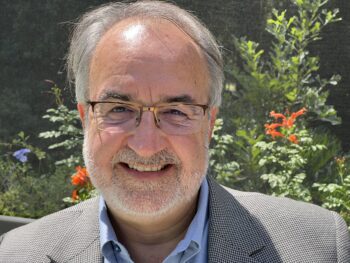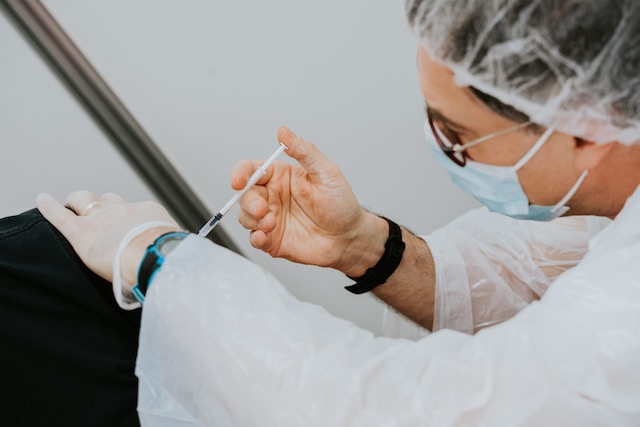Jennifer Camel-Toueg’s son was not getting better.
“Alex, who is now 20 years old, was diagnosed with ulcerative colitis at 17,” recalled Camel-Toueg. “With a diagnosis like that, the typical gastroenterologist will tell you that this is a disease where the only way to help is to treat the symptoms with medications which will hopefully lead to clinical remission. So, we started off with the basic drugs and then progressed to the more hardcore stuff—the ones where you have to go to the hospital and sit for a few hours and get an infusion in your arm.”
Yet Alex’s condition was not improving. “2021 was probably the worst year of my son’s life,” she said. “He was pretty much always in bed. He was a sophomore in college, but he could barely go to his classes. He was in pain all the time, feeling sad and defeated. It was awful to see my son like this.” The medications that Alex was taking to treat his ulcerative colitis to move the condition into clinical remission were not doing the trick.
“The year progressed, and the disease just got worse. Alex was eventually promoted to anti-TNF drugs, which are even stronger biologics and suppress your immune system to a greater degree. It’s a scary thing to think about having that being done to your body—especially during the COVID pandemic.”
“I wasn’t convinced that our current course was the only way,” said Camel-Toueg. “I kept asking the doctors, I kept saying, ‘Isn’t there another way?’ And I started researching. I heard of something called stem cell therapy.”
When she asked her doctors about clinical trials for the new therapy, they admitted to hearing about it but had no real knowledge of it and directed her to clinicaltrials.gov. Camel-Toueg thought she’d found her answer.
“I thought, ‘Oh, wow, how promising!’” Camel-Toueg recalled. “I ran home from the appointment and started on this website… which was incredibly difficult to navigate. I started looking for trials; they often weren’t what I was looking for, I couldn’t tell if they were FDA-authorized, and I later found that a lot of them were not FDA-authorized. So it was a bit of a wild west. I more or less ended up abandoning that idea.”

It was stories like Camel-Toueg’s that spurred Keith March, M.D., Ph.D.. Director of the University of Florida Center for Regenerative Medicine, to connect with Peter Marks, M.D., Ph.D., Director of the Center for Biologics and Research (CBER) at FDA, and a team of medical professionals about creating TrueTrials, an online platform aimed at connecting patients with FDA-authorized clinical trials of cell-based therapies.
There has to be a better way
“A lot of people don’t realize that not all clinical trials are FDA-authorized,” explained Dr. March. “When you look at a website that has a “.gov” at the end, it is natural to assume that all of the trials listed are FDA-authorized, but in this case, they are not. One of the frustrations in navigating the world of regenerative medicine is that you can find lots of approaches that aren’t FDA-authorized, and hear concerns about these, but there has been no easy-to-navigate listing helping patients locate only those trials that have IND (investigational new drug) or IDE (investigational device exemption) authorization.”
And so, March thought about what could be done to fix this issue. He began by talking with Marks, who encouraged the idea, and so TrueTrials was born.
“What is unique about TrueTrials is that it’s focused on regenerative medicine and cell therapy specifically,” explained Nancy Myers, Executive Director of TrueTrials. “It’s a digital platform that allows patients to come in on their own, look at their specific disease state, find clinical trials in the cell therapy area that are currently recruiting, and make sure that they can connect with those clinical trials to explore options. TrueTrials makes sure that anything that’s in our database has an FDA authorization to proceed—IND or IDE authorization.”
“It’s rather like the Good Housekeeping seal of approval,” said March. “Meaning that it validates that the trial is being conducted under FDA oversight, which ensures that products are made using good manufacturing practices (GMP), and provided by solid clinical teams.”
“That’s the difference for patients,” adds Myers. “These trials have already been pre-screened, and we intend to hold the required documentation confidentially to make sure that it’s happened.”
The rigor of the platform, found at www.truetrials.org, is part of what makes it so unique, and the program has taken such a solid stance on safety and validation that Marks called the platform “a safe space for patients.”
“Organizations have to actively choose to put their trial on TrueTrials,” explained Myers. “They have to see listing trials on TrueTrials as a way of distinguishing their science and trials, and therefore come to us directly. We review their documentation. And then when patients have questions, they can communicate with TrueTrials, or they can reach out to the sponsor directly.
We will be reaching out to listed trial administrators every two months to check whether or not their trials have been fully enrolled so that patients aren’t chasing their tails looking for trials that are not available. There also will be a significant educational component to the TrueTrials website, which we hope will educate people about cell therapies and about what to look for when considering a cell therapy trial.”
The democratization of clinical trials
“This effort is really a democratization of access to cell therapy trials,” continues Myers. “At least, that’s our objective.”
“Just like everyone can Google their disease these days, we’re working to create a platform that helps people learn about what to look for in an ethical cell therapy trial, what the risks and benefits are, and then get access to clinical trials near them. With this platform, people can put in their disease state, they’ll see a map of where these trials are happening, and the site will link them with the people they can talk to about inclusion and exclusion criteria so they can decide whether they are a good fit for a trial or not. We’re trying to make sure that every step of this process is very patient friendly.”
“TrueTrials would have been such a Godsend for us if it had existed years ago,” Camel-Toueg explains.

Luckily, she did find a clinical program that Alex could participate in through perseverance and hard work.
“I guess God was smiling down on us because we were connected with an experimental stem cell therapeutic,” she said. “And in June of 2023, Alex received his first stem cell treatment of 100 million cells. His life changed after that. He had significantly less abdominal pain. He had a heightened energy level. He was able to exercise again. He had an increased appetite. Everything he couldn’t do before, he can do now.”
“I can’t help but think how much easier this process would have been if we had access to something like TrueTrials,” Camel-Toueg adds.
“Connecting people with doctors and families and patients is really, really important. The fact that all of the trials there are FDA-authorized is a really big deal because there are so many people out there saying that they do research related to things like stem cells and then you find out that they could be using dead stem cells, which won’t harm anyone, but it’s not going to produce any benefits to the patients participating.”
“You know,” added March, “the example of the issue with dead stem cells is a real thing. Some years ago, our laboratory tested batches for an organization and found that their stem cells were dead. Of course, they didn’t mean to have that happen. It was just that the controls weren’t quite in place. They just overheated the batch. But that is just another reason why FDA oversight is important. And it’s doubly important to make sure that patients then know where to go, especially with therapies as important as those found in regenerative medicine.”
TrueTrials is an exciting platform that addresses key needs. While the most immediate need met is that of patients looking for safe and ethical clinical trials, it is undeniable that the robust system that TrueTrials is creating is also good for investigators conducting cell-based clinical trials as well. It offers investigators another tool to more rapidly recruit eligible patients from a broader range of communities, and hopefully drive the cost of trials down through efficient recruitment. While the main goal is to include an additional layer of safety for patients, TrueTrials will improve the medical landscape for everyone involved.
“We think that TrueTrials is actually a very good win-win for patients, investigators, providers, and FDA,” Myers concludes. “It’s a public good.”




